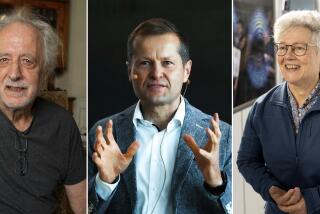Physicists Bring Light to Full Stop
- Share via
Physicists say they have brought light to a complete halt for a fraction of a second and then sent it on its way, an achievement that could someday help scientists develop powerful new computers.
The research differs from work published in 2001 that was praised at the time as having brought light to a standstill.
In that work, light pulses were technically “stored” briefly when individual particles of light, or photons, were taken up by atoms in a gas.
Harvard University researchers have topped that feat by truly holding light and its energy in its tracks -- if only for a few hundred-thousandths of a second.
“We have succeeded in holding a light pulse still without taking all the energy away from it,” said Mikhail D. Lukin, who reported the achievement in the Dec. 11 issue of Nature.
Harnessing light particles to store and process data could aid development of the still-distant goal of so-called quantum computers, as well as methods for communicating information over long distances without risk of eavesdropping.
The research may also have applications for improving conventional fiber-optic communications and data processing techniques that use light as an information carrier.
Matthew Bigelow, a scientist at the University of Rochester involved in light research, called the new study “very clever” and something that may ultimately spur the development of superior light-based computers.




